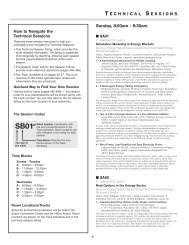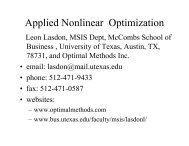Sunday
Sunday
Sunday
You also want an ePaper? Increase the reach of your titles
YUMPU automatically turns print PDFs into web optimized ePapers that Google loves.
SA08<br />
4 - Predictive Modeling of Glycosylation Modulation Dynamics in<br />
Cardiac Electrical Signaling<br />
Hui Yang, Assistant Professor, University of South Florida,<br />
Tampa, FL, 33620, United States of America, huiyang@usf.edu<br />
The cardiac action potential is produced by the orchestrated functions of ion<br />
channel dynamics. This investigation is aimed at modeling the variations of<br />
cardiac electrical signaling due to remodeling of a K+ channels. This multi-scale<br />
modeling investigation reveals novel mechanisms of hERG channel modulation<br />
by regulated glycosylation that also impact cardiac myocyte and tissue functions.<br />
It can potentially lead to new pharmaceutical treatments and drug designs for<br />
cardiac arrhythmia.<br />
■ SA08<br />
08- West 104 B- CC<br />
Inventory Management for Global Health<br />
Sponsor: Public Programs, Service and Needs<br />
Sponsored Session<br />
Chair: Jeremie Gallien, London Business School, Regent’s Park,<br />
London, NW14SA, United Kingdom, jgallien@london.edu<br />
1 - Improving the Public Distribution of Essential Medicines in<br />
Sub-Saharan Africa: The Case of Zambia<br />
Zachary Leung, Massachusetts Institute of Technology,<br />
77 Massachusetts Ave., Cambridge, MA, United States of America,<br />
zacleung@mit.edu, Jeremie Gallien, Prashant Yadav<br />
Despite remarkable and successful improvements efforts by the government and<br />
its partners, the current public distribution system of essential medical drugs in<br />
Zambia still results in low availability to patients relative to private sector<br />
standards. We present an alternative design involving mobile devices and<br />
optimization and evaluate this proposal via a simulation model built with field<br />
data. Our results suggest that this proposal would improve drug availability and<br />
reduce inventory costs.<br />
2 - Malaria Treatment Distribution in Developing World Health<br />
Systems and Application to Malawi<br />
Hoda Parvin, Research Analyst, CNA, 4825 Mark Center Dr.,<br />
Alexandria, VA, 22311, United States of America,<br />
parvinh@cna.org, Shervin AhmadBeygi, Mark Van Oyen,<br />
Peter Larson, Jonathan Helm<br />
We present stochastic models to address malaria treatment distribution in<br />
developing world under demand uncertainty. We first analyze a two-stage<br />
stochastic programming approach to make aggregate-level nation-wide decisions.<br />
We then present a Markov decision model to develop operational-level<br />
transshipment strategies within a cluster of clinics.<br />
3 - Public Health Impact of the Global Fund’s Performance-based<br />
Financing Process: A Queueing Analysis<br />
Iva Rashkova, London Business School, London, United Kingdom,<br />
irashkova.phd2009@london.edu, Jeremie Gallien, Prashant Yadav<br />
The Global Fund is the largest financier of programs against HIV, Malaria and<br />
Tuberculosis. We study its disbursement process through (i) an econometric<br />
analysis of disbursement and procurement data between 2003 and 2012; and (ii)<br />
a queueing model predicting national stock levels of medicines. This model<br />
quantifies the impact of the current process on central drug availability in 48<br />
African countries and potential interventions that include bridge financing and an<br />
international buffer stock.<br />
4 - Inventory Management in Humanitarian Supply Chains:<br />
The Role of Schedules and Uncertainty in Funding<br />
Karthik V. Natarajan, University of North Carolina, Chapel Hill,<br />
NC, United States of America, karthik_natarajan@unc.edu,<br />
Jayashankar M. Swaminathan<br />
Motivated by the ready-to-use therapeutic food (RUTF) supply chain in Africa, we<br />
study the problem of managing inventory of a nutritional product in the presence<br />
of variable funding constraints. We derive the structure of the optimal inventory<br />
and allocation policy and computationally analyze the impact of different funding<br />
schedules on the operating costs andwaiting times in the system.<br />
INFORMS Phoenix – 2012<br />
58<br />
■ SA09<br />
09- West 105 A- CC<br />
Evolutionary Multi-Criterion Optimization - I<br />
Sponsor: Multiple Criteria Decision Making<br />
Sponsored Session<br />
Chair: Kalyanmoy Deb, Professor, Indian Institute of Technology<br />
Kanpur, Department of Mechanical Engineering, Kanpur, UP, 208016,<br />
India, deb@iitk.ac.in<br />
1 - A Decentralized Bicriteria Timeshare Exchange Algorithm<br />
Bahriye Cesaret, PhD Student, Jindal School of Management,<br />
University of Texas at Dallas, 800 West Campbell Road,<br />
Richardson, TX, 75080, United States of America,<br />
bahriye.cesaret@utdallas.edu, Milind Dawande,<br />
Tharanga Rajapakshe<br />
Timeshare Exchange refers to the trading of vacation timeshare weeks among<br />
owners, so that they can interchange their respective vacation homes and thereby<br />
experience new destinations. We consider two objectives to capture the notions of<br />
“efficiency” and “fairness” in an exchange solution. Our main contributions<br />
include (i) a structural analysis of the resulting bicriteria timeshare exchange<br />
problem and (ii) a polynomial-time, decentralized algorithm for “good” bicriteria<br />
solutions.<br />
2 - Cooperative Surrogate Models Improving Multi-objective<br />
Evolutionary Algorithms<br />
Saúl Zapotecas Martìnez, CINVESTAV-IPN, Mexico, D.F., Mexico,<br />
saul.zapotecas@gmail.com, Carlos A. Coello Coello<br />
We present a multi-objective evolutionary algorithm (MOEA) assisted by two<br />
different meta-models: a local and a global one. The global model is constructed<br />
by using different surrogate models. The local model is generated by using the<br />
solutions in the current population of the MOEA. The training set for each model<br />
is updated along the search of the MOEA. The two different predicted values of<br />
the functions provided by the meta-models are used to estimate the final value of<br />
each function.<br />
3 - Diversity Enhancing Evolutionary Multiobjective Search<br />
Brian Piper, North Carolina State University, 2500 Stinson Drive,<br />
Raleigh, NC, United States of America, bepiper@ncsu.edu,<br />
Ranji Ranjithan, Hana Chmielewski<br />
Besides obtaining Pareto-optimal solutions, decision diversity is an important<br />
consideration in real-world multiobjective problems. Diversity can be defined as<br />
both the spread of solutions in the decision space and degree to which alternative<br />
solutions are available. We present algorithms for obtaining diverse Paretooptimal<br />
sets and compare results for several test problems to demonstrate the<br />
effectiveness of the algorithms.<br />
4 - Satisfying Multiple Objectives in Infrastructure<br />
Management Planning<br />
Hana Chmielewski, North Carolina State University, Campus Box<br />
7908, Raleigh, NC, United States of America, htchmiel@ncsu.edu,<br />
Ranji Ranjithan<br />
Evolutionary algorithms lend themselves to solving cross-disciplinary problems<br />
with multiple objectives. In infrastructure planning, for example, it may be useful<br />
to consider the resource and performance objectives of engineers, land-use<br />
planners, and emergency managers. An algorithm that offers maximally different<br />
non-inferior management plans by preserving the diversity of solutions in the<br />
decision space is applied to aid decision-making inwastewater treatment planning.<br />
■ SA10<br />
10- West 105 B- CC<br />
Risk in Stochastic Programming<br />
Sponsor: Optimization/Stochastic Programming<br />
Sponsored Session<br />
Chair: Sitki Gulten, PhD Candidate, Rutgers University, Department of<br />
Management Science & Infor, 1 Washington Park, Newark, NJ, 07102,<br />
United States of America, sgulten@rutgers.edu<br />
1 - Two-stage Portfolio Optimization with Higher-order Conditional<br />
Measures of Risk<br />
Sitki Gulten, PhD Candidate, Rutgers University, Department of<br />
Management Science & Infor, 1 Washington Park, Newark, NJ,<br />
07102, United States of America, sgulten@rutgers.edu,<br />
Andrzej Ruszczynski<br />
Optimization of a portfolio with an option to rebalance over multiple periods<br />
from is a major problem in modern portfolio theory. In this research, different<br />
forward and backward scenario tree generation techniques are applied on<br />
multivariate GARCH-generated scenarios to construct scenario trees. Next, mean-



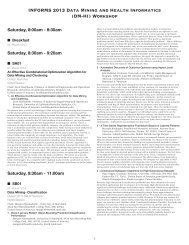
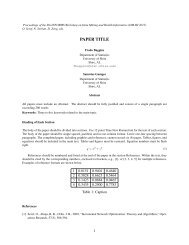
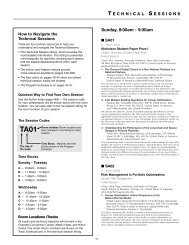
![[PDF] Charlotte Back Matter](https://img.yumpu.com/17933057/1/190x245/pdf-charlotte-back-matter.jpg?quality=85)
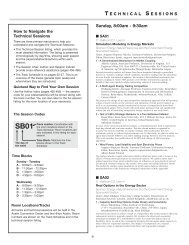
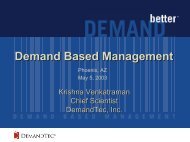
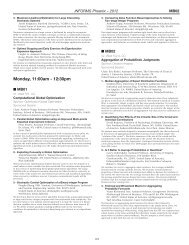
![[PDF] ALIO Back Matter](https://img.yumpu.com/17932960/1/190x245/pdf-alio-back-matter.jpg?quality=85)

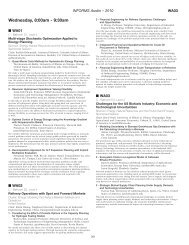
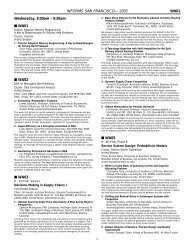
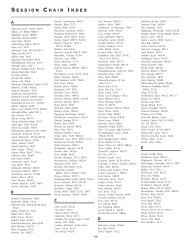
![[PDF] Monday, 8:00am - 9:30am](https://img.yumpu.com/17932954/1/190x245/pdf-monday-800am-930am.jpg?quality=85)
